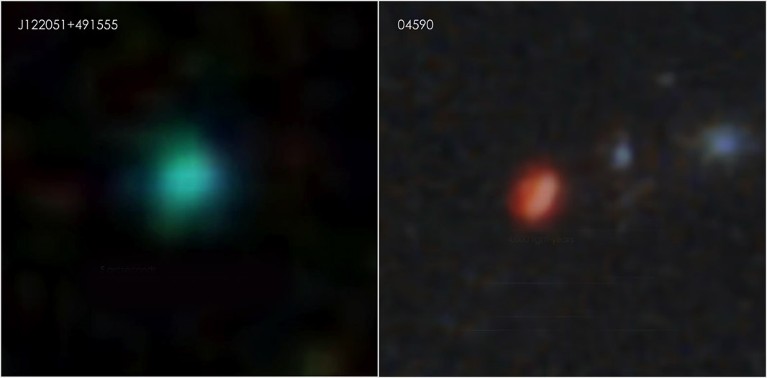Hello Nature readers, would you like to get this Briefing in your inbox free every day? Sign up here

JWST has helped astronomers to discover distant galaxies (right) that are similar to ‘green pea’ galaxies (left, imaged by the Sloan Digital Sky Survey) from the nearby Universe.Credit: SDSS and NASA, ESA, CSA, and STScI
Astronomers using the James Webb Space Telescope (JWST) have found three tiny galaxies that could explain a watershed epoch in the history of the Universe. Reionization was a period just 700 million years after the Big Bang when harsh radiation tore apart a ‘fog’ of hydrogen atoms hanging over the Universe, rendering stars and galaxies visible for the first time. JWST was able to observe with unprecedented clarity tiny galaxies that are so far away (and thus so old) that they were active at the time of reionization. Three of these ancient galaxies look similar to closer ones that astronomers know well — called ‘green pea’ galaxies because of their green glow. They are prolific stellar nurseries, and emit enough energy that they might have been responsible for freeing the cosmos from its dark age.
Reference: The Astrophysical Journal Letters paper
The wave of infections that followed the end of China’s strict zero-COVID policy probably peaked in late December. Researchers simulated the number of infections in different regions by combining information on how the virus was spreading in October and November 2022 with data on travel between cities across the country. The analysis has been seen by Nature, but has not been published or peer reviewed. A lack of official data has obscured the true magnitude and severity of the outbreak.
Men have conceived children, on average, 7 years later than women have throughout the past 250,000 years. Researchers used DNA mutations that parents pass on to their children to discover that the average age of conception for women was 23.2 years and 30.7 years for men. The reasons could be biological — men are able to have children later in life than women can — or might include social factors, such as the fact that some societies pressure men to build up their status before becoming fathers.
Reference: Science Advances paper
More than 1,700 researchers are urging the US National Science Foundation (NSF) in an open letter to add a question about sexual orientation to its college graduate survey. “If we don’t have the data to understand potential differences or disadvantages, the silence of the data itself reproduces inequality,” says sociologist Erin Cech. The NSF says its decision to exclude the question was because of data-quality and privacy issues, and because in tests it led to more people quitting the survey.
Whistle-blowers at the Journal of Clinical Investigation (JCI) will now be obliged to list their conflicts of interest after a group of complainants failed to disclose theirs. The group had flagged potentially doctored images in papers by a researcher involved in testing the experimental Alzheimer’s drug simufilam, made by US drug firm Cassava Sciences. JCI editor-in-chief Elizabeth McNally alleges that the whistle-blowers profited from selling Cassava stock as its price fell. “This represents a new means of manipulating the scientific-publishing industry,” she says. The whistle-blowers deny any wrongdoing and stand by their allegations. Expressions of concern and corrections have been issued for two of the three key simufilam papers.
Philanthropists provide a huge chunk of research funding and there are many thousands of organizations doling out small amounts. But there’s no central repository of all the grants available, so it can be challenging for researchers to find the right one. Four scientists who have acquired private donations share how they successfully navigated the private funding landscape.
A catalogue of 67 million software mentions from 20 million biomedical papers helps researchers and developers to identify their field’s most popular software and evaluate each tool’s impact. The Chan Zuckerberg Initiative project aims to put the spotlight on the software that was behind breakthroughs such as protein structure prediction, which are rarely formally published or cited.
Manage expectations, remind people of achievements and take some time out to have fun — this is what gets teams through tough times, says conservationist Jim Groombridge. He knows how to keep morale high amid failure on the basis of his experience leading the attempt to save the last po‘ouli (Melamprosops phaeosoma), a Hawaiian bird declared extinct in 2019. “There’s a delicate balance between being aspirational and being pragmatic,” Groombridge says.
“If we can introduce researchers to leadership models who will help them to think about the kind of leader they want to be, it could break some of the negative patterns we see today in research,” says Simon Kay, who became a life coach after 25 years of managing research programmes. Coaching can help to change ingrained behaviours, he explains, and can benefit someone struggling with impostor syndrome just as much as someone accused of bullying.














